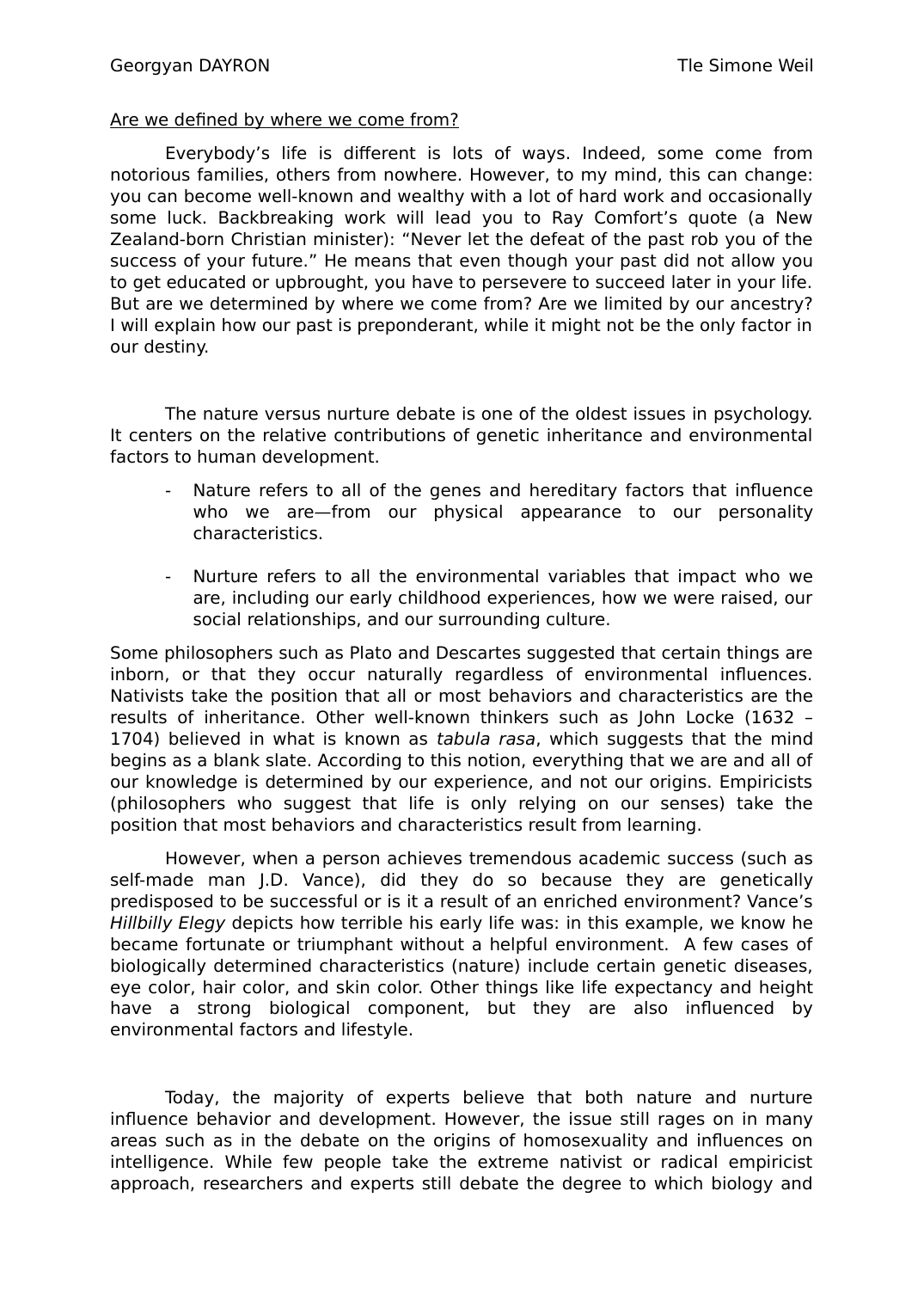Are we defined by where we come from?
Publié le 26/09/2021

Extrait du document
«
Georgyan DAYRON Tle Simone Weil
Are we defined by where we come from?
Everybody’s life is different is lots of ways.
Indeed, some come from
notorious families, others from nowhere.
However, to my mind, this can change:
you can become well-known and wealthy with a lot of hard work and occasionally
some luck.
Backbreaking work will lead you to Ray Comfort’s quote (a New
Zealand-born Christian minister): “Never let the defeat of the past rob you of the
success of your future.” He means that even though your past did not allow you
to get educated or upbrought, you have to persevere to succeed later in your life.
But are we determined by where we come from? Are we limited by our ancestry?
I will explain how our past is preponderant, while it might not be the only factor in
our destiny.
The nature versus nurture debate is one of the oldest issues in psychology.
It centers on the relative contributions of genetic inheritance and environmental
factors to human development.
- Nature refers to all of the genes and hereditary factors that influence
who we are—from our physical appearance to our personality
characteristics.
- Nurture refers to all the environmental variables that impact who we
are, including our early childhood experiences, how we were raised, our
social relationships, and our surrounding culture.
Some philosophers such as Plato and Descartes suggested that certain things are
inborn, or that they occur naturally regardless of environmental influences.
Nativists take the position that all or most behaviors and characteristics are the
results of inheritance.
Other well-known thinkers such as John Locke (1632 –
1704) believed in what is known as tabula rasa , which suggests that the mind
begins as a blank slate.
According to this notion, everything that we are and all of
our knowledge is determined by our experience, and not our origins.
Empiricists
(philosophers who suggest that life is only relying on our senses) take the
position that most behaviors and characteristics result from learning.
However, when a person achieves tremendous academic success (such as
self-made man J.D.
Vance), did they do so because they are genetically
predisposed to be successful or is it a result of an enriched environment? Vance’s
Hillbilly Elegy depicts how terrible his early life was: in this example, we know he
became fortunate or triumphant without a helpful environment.
A few cases of
biologically determined characteristics (nature) include certain genetic diseases,
eye color, hair color, and skin color.
Other things like life expectancy and height
have a strong biological component, but they are also influenced by
environmental factors and lifestyle.
Today, the majority of experts believe that both nature and nurture
influence behavior and development.
However, the issue still rages on in many
areas such as in the debate on the origins of homosexuality and influences on
intelligence.
While few people take the extreme nativist or radical empiricist
approach, researchers and experts still debate the degree to which biology and.
»
↓↓↓ APERÇU DU DOCUMENT ↓↓↓
Liens utiles
- Malta is an archipelago of 3 overpopulated islands where the scarcity ofland and the cost of water are major problems.
- The Voyage Out (1915)Virginia WoolfChapter IAs the streets that lead from the Strand to the Embankment are very narrow, it isbetter not to walk down them arm-in-arm.
- Rosencrantz and Guildenstern are dead
- Dissertation sur le malade imaginaire: La comédie de Molière n'a-t-elle pour seul but que de nous faire rire ?
- After forever, I got out of bed and went to the closet where I kept the phone.


